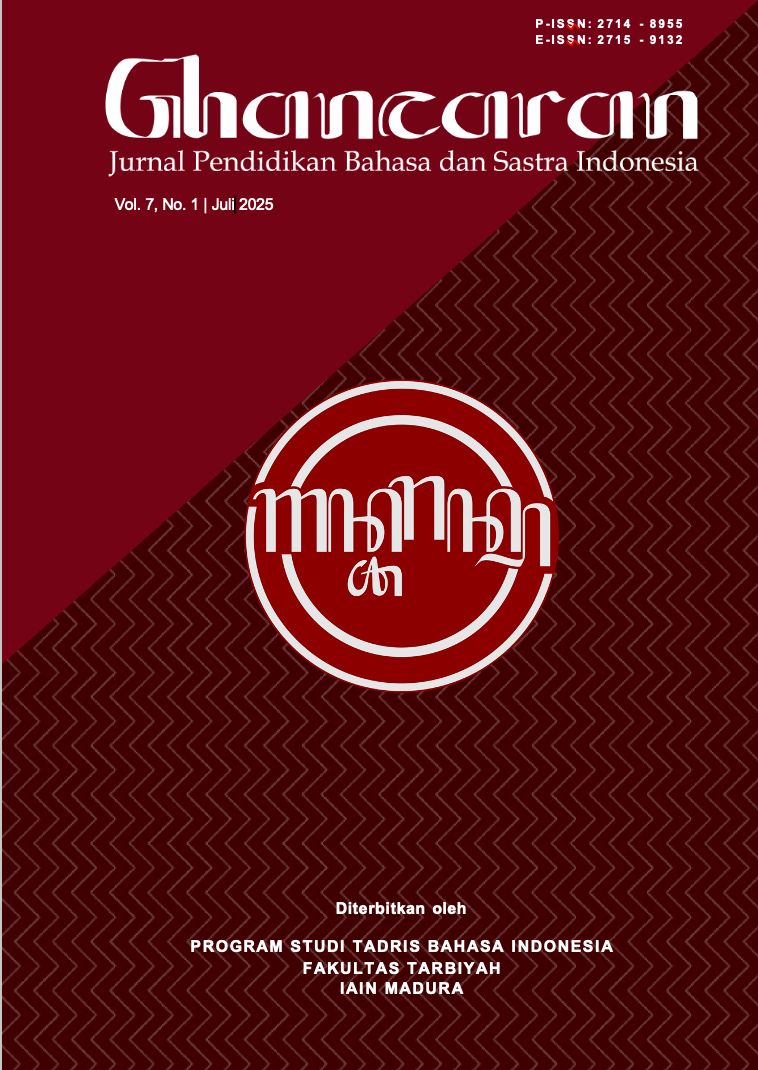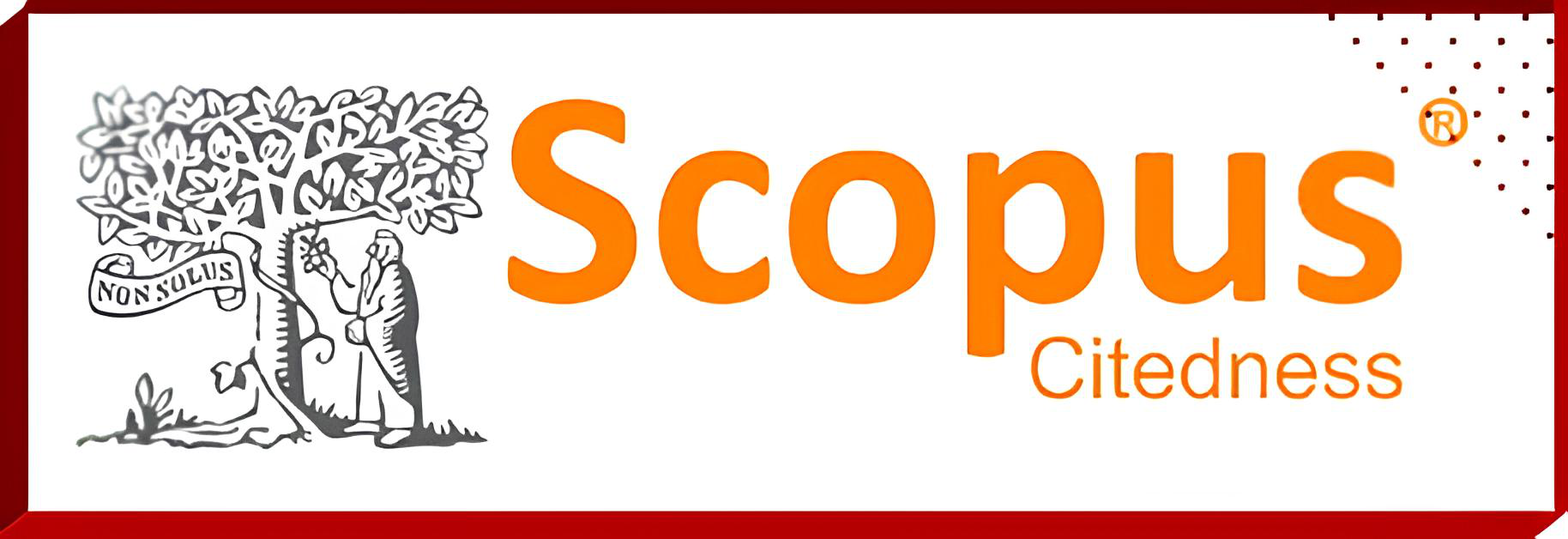Perlawanan Untuk Memperjuangkan Hak dan Keadilan dalam Novel Karmila Karya Marga Tjoa: Feminisme Eksistensialis Simon De Beauvoir
 Abstract views: 528
,
Abstract views: 528
,
 PDF downloads: 411
PDF downloads: 411
Abstract
This research analyzes the main character's form of resistance in the novel Karmila by Marga Tjoa, focusing on women's struggle for rights and justice within the framework of Simon de Beauvoir's existentialist feminism. Through a qualitative descriptive method that describes the object's situation based on facts, relevant excerpts of the novel are analyzed to understand how the author expresses existentialist feminism in a literary work. The results show that Karmila fights for rights and justice by becoming a working woman, pursuing education and achieving career success, and rejecting subordination by opposing traditional roles that limit women's freedom. The study concludes that Karmila in the novel is a strong example of women's struggle to take control of their own lives by resisting any form of oppression or dependence on others, in accordance with Simon de Beauvoir's principles of existentialist feminism.
Downloads
References
Azzahra, N. (2022). Eksistensi Perempuan dalam Novel Jumhuriyyatu Ka’anna Karya Alaa al-Aswany: Kajian Feminisme Eksistensialis Simone De Beauvoir. Middle Eastern Culture & Religion Issues, 1(2), 116–132.
Clarissa, J. A. (2023). Budaya Patriarki dalam Lingkup Masyarakat Menengah ke Bawah dalam Pandangan Feminisme Eksistensialis Simone de Beauvoir. Gunung Djati Conference Series, 24, 814–827.
Beauvior, S. D. (2016). The Second Sex. in Social Theory Re-Wired. Routledge.
Tjoa, M. (1994). Karmila. Jakarta: PT Gramedia Pustaka Utama.
Mawaddah, H., Suyitno, & Suhita, R. (2022). Strategi Perempuan Jawa Memunculkan Identitas Dirinya dalam Budaya Patriarki. Aksara, 34(1), 19–28.
Meivitasari, Y., & Widyatwati, K. (2023). Bentuk Ketidakadilan Gender dan Perlawanan Tokoh Kinanti dalam Novel Layangan Putus (Kajian Feminisme Eksistensialisme Simone De Behaviour). Diglosia: Jurnal Kajian Bahasa, Sastra, Dan Pengajarannya, 6(4), 1071–1080.
Olima Verah, E., & Yuwana, S. (2022). Subordinasi dan Inferioritas Gender dalam Novel La Barka Karya NH. Dini. Jurnal Education and Development, 10(3), 578–584.
Purnami, K., & Pramono, D. (2021). Eksistensi Perempuan dalam Novel Kitab Omong Kosong Karya Seno Gumira Ajidarma : Kajian Feminisme Eksistensialis Simone De Beauvoir. Mimesis, 2(1), 54.
Putri, S. P. (2022). Perjuangan Tokoh Utama dalam Novel Belenggu Karya Armijn Pane: Kajian Feminisme Liberal. Literasi : Jurnal Bahasa Dan Sastra Indonesia Serta Pembelajarannya, 6(2), 291.
Ramli, R. B., Ahnsari, A., & . J. (2021). Representasi Feminisme Eksistensial di Balik Film Marlina Si Pembunuh dalam Empat Babak. Lingue : Jurnal Bahasa, Budaya, dan Sastra, 3(2), 81.
Sagita, R., Supriatna, A., & Koso, H. (2023). Eksistensi Perempuan dalam Novel Yuni Karya Ade Ubaidil (Kajian Feminisme Eksistensialis Simone De Beauvoir). Jurnal Canon, 01(03), 192–200.
Sari, A., & Ririe, R. (2023). Peran dan Perjuangan Perempuan dalam Kumpulan Cerpen Kitab Kawin Karya Laksmi Pamuntjak : Perspektif Feminisme Liberal Naomi Wolf Avika Meidastiani Inggar Sari Ririe Rengganis Abstrak. Sapala, 10, 11–26.
Sari, R. H.(2022). Apresiasi Sastra Indonesia, Puisi, Prosa dan Drama. Tasikmalaya: Penerbit Perkumpulan Rumah Cemerlang Indonesia (PRCI).
Sastrawati, N. (2018). Laki-Laki dan Perempuan Identitas yang Berbeda: Analisis Gender dan Politik Perspektif Post-Feminisme. Makassar: Alauddin Press.
Setyatania, E. (2020). Eksistensi Tokoh Song Ziyan dalam Drama China Kehidupan Rasional 理智派生活(Lǐzhì pài shēnghuó)Karya Chen Tong dan Long Xiao Shan (Perspektif Feminisme Eksistensialis Simone De Beauvoir). E-Journal Unesa, 1–26.
Copyright (c) 2025 GHANCARAN: Jurnal Pendidikan Bahasa dan Sastra Indonesia

This work is licensed under a Creative Commons Attribution-ShareAlike 4.0 International License.
Ghancaran: Jurnal Pendidikan Bahasa dan Sastra Indonesia uses an Open Access Policy under the Creative Commons Attribution-ShareAlike 4.0 International License. Authors publishing in this journal agree to the following terms:
- Ghancaran Journal holds the copyright and grants the journal rights for first publication with the work simultaneously licensed under a

The work is distributed under Creative Commons Attribution-ShareAlike 4.0 International License which allows others to share, copy, and redistribute the material in any media or format and adapt, remix, change, and develop the material even for commercial purposes, as long as it is stated credit and license derivative works under similar terms. - Authors may make additional contractual arrangements for non-exclusive distribution of the journal's published work version.
- Authors are permitted to post their work online (e.g., in institutional repositories or on their websites) before and during submission, as doing so may lead to productive exchange.



















